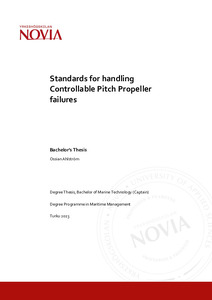Standards for handling Controllable Pitch Propeller failures
Ahlström, Ossian (2023)
Ahlström, Ossian
2023
Julkaisun pysyvä osoite on
https://urn.fi/URN:NBN:fi:amk-2023113033137
https://urn.fi/URN:NBN:fi:amk-2023113033137
Tiivistelmä
The maritime industry follows strict regulations which stipulate standards on ships and their
crew, but preparedness in handling system failures stands out in its absence from said
legislations. One of the more serious system failures is a Controllable Pitch Propeller failure,
which renders the ship unable to steer and/or to effectively regulate her speed. While
researching international regulations it is even discovered that audible alarms for this fault
are not a requirement by what is accepted as the most important maritime regulation for
safety, the Safety of the Life at Sea convention.
When investigating several accident reports, it appears that the bridge teams are not
adequately trained to properly handle a situation where a CPP is failing. This lack of training
results in severe damages and injuries. To establish how current training legislations prepare
Officers of the Watch to handle such failures, this study examined a group of maritime
students’ performances during a simulated CPP-failure scenario. The students were then
questioned about their thoughts of their performances. They appear to understand the failure,
but lack the training to rectify the situation under the pressure.
It appears that current maritime regulations contain an oversight within this area. This can
cause easily fixable problems to escalate into a disaster.
crew, but preparedness in handling system failures stands out in its absence from said
legislations. One of the more serious system failures is a Controllable Pitch Propeller failure,
which renders the ship unable to steer and/or to effectively regulate her speed. While
researching international regulations it is even discovered that audible alarms for this fault
are not a requirement by what is accepted as the most important maritime regulation for
safety, the Safety of the Life at Sea convention.
When investigating several accident reports, it appears that the bridge teams are not
adequately trained to properly handle a situation where a CPP is failing. This lack of training
results in severe damages and injuries. To establish how current training legislations prepare
Officers of the Watch to handle such failures, this study examined a group of maritime
students’ performances during a simulated CPP-failure scenario. The students were then
questioned about their thoughts of their performances. They appear to understand the failure,
but lack the training to rectify the situation under the pressure.
It appears that current maritime regulations contain an oversight within this area. This can
cause easily fixable problems to escalate into a disaster.
